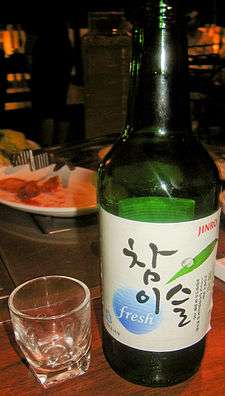HiteJinro
HiteJinro Co., Ltd. (Korean: 하이트진로; Hanja: 眞露; Korean pronunciation: [tɕilo]) is a distiller in South Korea, founded in 1924. It is the world's leading producer of soju, accounting for more than half of that beverage's domestic sales. It also manufactures a variety of other alcoholic beverages including red wine and whiskey. Distilleries are located in Icheon, Cheongwon, and Masan, with the Masan plant geared toward exports. In addition, Jinro produces the Soksu brand of bottled water at a factory in Cheongwon. Jinro has been involved in exporting since 1968, when it began shipping soju to Vietnam in the midst of the Vietnam War.
 | |
Native name | 하이트진로 |
|---|---|
| Public | |
| Traded as | KRX: 000080 |
| Industry | Beverage |
| Founded | October 3, 1924[1] |
| Headquarters | 714 Yangdongdae-ro, Gangnam District, Seoul, South Korea |
Key people | Kim In-Kyu (President and CEO)[2] Park Moon-Deuk (Chairman)[3] |
| Products | |
| Parent | Hite Holdings Co., Ltd. (50.86%)[4] |
| Website | english |
| History |
|---|
| Business culture |
| Industries |
|
| Regional |
| Related topics |
Jinro soju is known by the brand name Chamisul (참이슬), which is the world's most popular liquor. Part of their marketing strategy is to use temperature sensitive paper on their bottle label. A tab in the shape of an Asiatic Toad (the company's mascot) is white when the bottle is warm and becomes blue when the bottle is cold, indicating that the soju is ready to drink.
In 2006, the company was acquired by Hite, a popular beverage company whose main product is beer.
The target for 2014 sales are 2.2049 billion won, with an operating profit of 4.876 billion won; as a result, HiteJinro is expected to be the first liquor company in Korea to surpass 2 trillion won in sales.
Jinro has been named the top-selling spirit in the world in the Millionaires' Club 2016, after selling 73.8m 9-litre in the year 2015.[5]
Products
Beer
- Hite
- Max
- Dry Finish D
- Stout
- Exfeel S
- Queen's Ale – Blonde Type
- Queen's Ale – Extra Bitter Type
Soju

Jinro is the largest manufacturer of soju accounting for half of all white spirits sold in South Korea.[6] Soju accounts for 97% of the category. Global sales in 2013 were 750 million bottles; the second-largest spirits brand, Smirnoff, sold less than half that number.[7] The most popular variety of soju is currently Chamisul[6] (참이슬 - literally meaning "real dew"), a quadruple-filtered soju produced by Jinro. Other brands include:
- Chamisul Classic
- Chamisul Nature
- IlpumJinro
- JINRO GOLD
- Chamisul Damgeumjoo
- chamisul fresh
- jinro 24
- chamisul grapefruit
- chamisul green grape
- chamisul plum
- jinro tok-tok sparkling soju peach
- jinro tok-tok sparkling soju pineapple
Whiskey
- Kingdom
- Cutt Sark
Wine
- HiteJinro wine
Subsidiary brands
- Seoksu natural mineral water
- Puriss
Success of Chamisul Fresh[8]
On October 19, 1998, Chamisul, which debuted in the domestic soju market, broke the common sense that soju is 25% ABV and changed the image of strong soju to " soft and clean. "It is the best brand of domestic soju. As a byword for soju following Jinro, Chamisul changed the history of the soju market in terms of quality, brand power, and sales volume.It's a breakthrough. " Chamisul, " which started out as a 23% ABV product when it was released, is now 20.1% ABV and 17.2 degrees% ABV. These two brands are leading the domestic soju market.
Chamisul, which has been gaining huge popularity by using bamboo charcoal filtration method when it was launched, has been renewing its products seven times.
Chamisul has become a byword for soju, a single brand with more than 50 percent of the national market in just two years.
Impact on Korean drinking culture
Hitejinro’s product line which includes 6 beers, most notably the Hite label, 7 soju lines, to include the Korean favorite, Chamisul; 2 whiskey variations, and one wine, garnered them a sizeable market share. Hite Brewery Co., Ltd. is the leading player in the Korean alcoholic drinks market, generating a 50.2% share of these.[note 1]
Jinro's brand of soju is the biggest-selling spirit in the world, according to a survey by the UK-based Drinks International magazine, easily outselling vodka and whisky brands last year.[note 2]
Average adult annual consumption of spirits in South Korea is 9.57 liters, the world’s highest, according to 2005 data from the World Health Organization published last year. The Korean landscape of drinking has resulted in numerous street brawls, increased family violence and other crimes involving drinking. This prevalent problem is further exacerbated due to very minimal government punishment when a crime is committed with alcohol.[note 3]
Due to these occurrences, Hite-Jinro has begun putting warning labels on bottles of Chamisul and Beer products with messages reading: "No more drunken violence! Let's improve wrong drinking culture!"[note 4]
"We felt tremendously responsible for social problems caused by drinking... we will help with efforts to change our drinking culture to a more positive one," said a sales manager at Hite-Jinro, quoted in Chosun Ilbo newspaper.
Expansion outside Korea
Soju sales are soaring and foreign companies are considering buying into one of the few Korean industries to relish the economic crisis. But outsiders face tough, patriotic competition.
With HiteJinro's most notable drink, Soju, it has quickly gained momentum and popularity as a vodka substitute. The spirit, which is distilled from rice, barley, and koji, has become a popular import; though, with the company operating in Russia, the US, South Korea, China and Japan, the Korean giant has begun setting its sights on India with a new bottling deal.[note 5]
Jinro actually went bankrupt during the Asian crisis of 1997, at which point it was bought by the Hite Corporation.[note 6]
See also
- List of Korea-related topics
- Economy of South Korea
References
- "HiteJinro > Introduction > History > 1972–1924". Retrieved 5 October 2016.
- "Kim In-Kyu, Hite Jinro Co Ltd: Profile & Biography - Bloomberg". Retrieved 5 October 2016.
- "Park Moon-Deuk, Hite Jinro Co Ltd: Profile & Biography - Bloomberg". Retrieved 5 October 2016.
- "HiteJinro > Shareholders' Information > Shareholding Structure". Retrieved 5 October 2016.
- "Jinro dominates Millionaires' Club list again". Alacra. 25 May 2016. Retrieved 5 October 2016.
- "It's official: Jinro soju is the world's best-selling liquor". Cable News Network. Turner Broadcasting System, Inc. Retrieved December 15, 2015.
- "Jinro Soju – the world leader". The Whiskey Exchange. 2015-05-20. Retrieved December 14, 2015.
- http://www.hitejinro.com/socialmedia/chamisul_marketing_1.asp. Missing or empty
|title=(help)
Notes
- Alcoholic Drinks Industry Profile: South Korea, 1-28 (2014, Ahn Dae-hwan)
- Soju: The New Vodka (4 Oct 2004, Kate Bonamici, Fortune)
- S. Korean soju and beer labels warn against drunken violence (12 Jul 2012, AFP Relaxnews, New York Daily News)
- South Korea: Let's Improve Wrong Drinking Culture! (12 Jul 2012, May Wilkerson, TheFix.com)
- Korean soju giant inks India bottling deal (29 Apr 2013, Boby Kurian & Anshul Dhamija, The Times of India)
- Koreans drown economic sorrows in soju (22 Dec 2008, Song Jung-a & Christian Oliver, Financial Times)
External links
- Official website (in Korean)